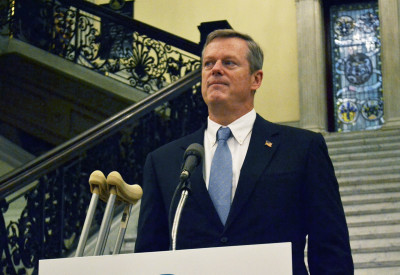
Massachusetts Gov. Charlie Baker spoke out Tuesday in support of the Massachusetts Department of Children and Families’ first major policy change in 30 years, regarding child neglect and abuse.
The DCF plans to initiate change statewide February 1 by implementing a new Intake Policy and an original Supervision Policy, according to a Tuesday press release.
The release stated that the Intake Policy serves as an updated set of guidelines for the investigation of child abuse reports, while the Supervision Policy will assist social workers in identifying situations that require greater attention and their associated risk factors.
“The new intake and supervisor policies that DCF is announcing today represent the first step in a much needed systemic reform of DCF policies and practices,” Baker said in the release. “These new policies provide the framework for DCF to be responsive and accountable in its mission to protect every child we serve in every way we can.”
The release stated that the two major goals of the policy reforms are to increase the speed and effectiveness of case screening and to mandate a higher level of investigation for all reports.
Another section of the new policy will eliminate the two-tiered system previously employed by the DCF. Instead of splitting cases into categories of high or low risk, all cases will be considered with equal depths of investigation.
DCF Commissioner Linda Spears said in the release that several of the new policies focus on heightened case attention.
“Every case must be discussed at least once a month,” Spears said in a video attached to the release, “which will promote more collaborative responses and better case management.”
However, the updated guidelines have raised concerns from various child advocacy organizations. Some said the Department may not have adequate resources to fully address all cases of child abuse.
Charles Lerner, executive director of Court Appointed Special Advocates in Boston, explained that the challenge of solving cases of child neglect and abuse is much larger than actions taken by the DCF.
“I’m not sure that there is one sort of shift in practice that will be a ‘savior to the system’ or create major reform and address all the concerns that the general public and we all have about the child protection services here in Massachusetts,” Lerner said.
However, Lerner expressed concern regarding the efficiency of spending the same amount of time on each and every case.
“The volume of abuse or neglect reports is so immense that there has to be a process or place that allows the department to delineate the cases that really need to take high priority versus cases that may need more minimal support or services that could still adequately address any of the risk factors that may be in the home,” Lerner said.
Lerner stressed the importance of support for nonprofits and advocacy programs designed to assist families and children before they become involved with the DCF.
“There are more creative strategies to addressing larger systemic issues,” Lerner said. “The community needs to step up and support those organizations to be able to do the critical work they need to do.”
Boston-area residents were skeptical about the new policies, but curious to see if their implementation would aid the issue of child neglect and abuse in Massachusetts.
Jeanine Browne, 46, of Back Bay, said it is important to give additional attention to higher-risk child abuse cases
“I believe all child abuse is horrible and should be paid attention to whether it’s low or high risk,” Browne said. “But high-risk cases should remain separate to serve as an alert that something is very terribly wrong, such as [a situation] that may take a child’s life.”
Peter Szolovits, 57, of Brighton, emphasized the importance of making sure policies focus on the best interest of the children involved.
“The policies should be working to get better care for kids and not have them muted by parents, foster parents or other people,” Szolovits said. “But I’m not sure of the best way to do that successfully.”
Dan Cambell, 31, of Roxbury, said he was glad to see these reforms and hoped they would bring out the importance of child abuse investigation.
“[The reforms] are certainly a good idea,” Cambell said. “Crimes at that level should get fast-tracked over litigation cases that are still criminal but lower-level crimes.”























































































































william headley • Jun 20, 2016 at 2:36 pm
https://amiracleforus.wordpress.com/2016/06/06/lawsuits-and-rape-of-children-mean-nothing-in-s-c/